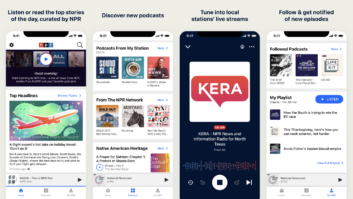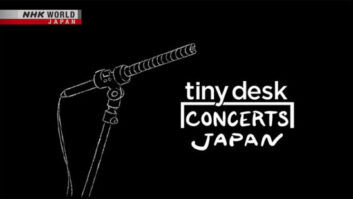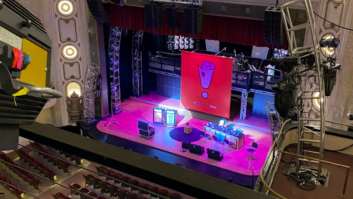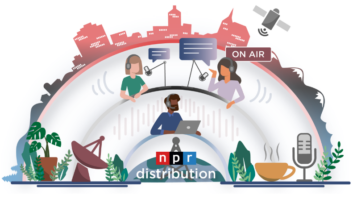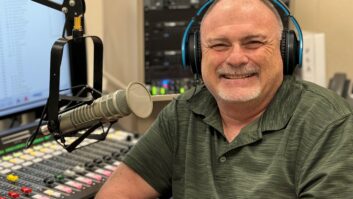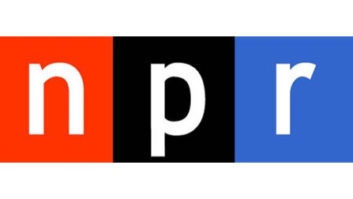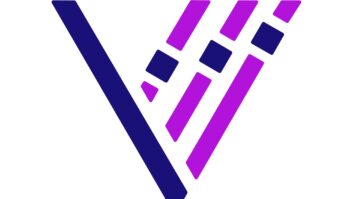Paul McLane is editor in chief.
I checked in with NPR Technical Director Chris Nelson, who is in Tampa, about operations at the Republican National Convention. He wrote on Thursday morning:
McLane: How is it going for the NPR technical team in your task of supporting coverage of the GOP convention?
Nelson: Fairly well! We’ve had a few unexpected bumps in the road but nothing insurmountable.
McLane: How many people overall does NPR have at the convention in Tampa? How many are involved for the technical operations/engineering?
Nelson: NPR has about 30 total employees here in Tampa. About eight of those folks are dedicated to our nightly live coverage starting at 8 p.m. We also have staff from “Tell Me More,”“All Things Considered” and “Morning Edition” on site. And, in addition to that, a few reporters and editors filing for our news magazine shows, and three multimedia journalists for npr.org. We have two audio engineers, one technical director and four representatives from our technology group (IT/Telecom) supporting the efforts.
McLane: Briefly describe the gear each reporter carries.
Nelson: It really varies. Our floor reporters, for instance, are carrying Lectrosonics SM transmitters connected to Shure SM58s for live inserts into our evening special. They also carry Lectro IFB beltpacks to hear the show and information from our on-site producer/director. To keep the amount of gear they have to carry at a minimum we record the raw feed of each wireless mic. If an NPR reporter happens to get an interesting interview with a delegate or newsmaker at a time where we can’t go to them live, we still have the ability to use that audio later in our broadcast or for a story to be filed later.
McLane: Briefly describe the audio chain from reporter to NPR.
Nelson: Again, it totally varies depending on location. The most common are:
-NPR reporter via ISDN using a Musicam Roadrunner (Radio Row and NPR Workspace)
-NPR reporter via Comrex Access at NPR’s IP drop on the floor, or roving with Verizon 4G.
-NPR reporter via FTP using a traditional reporter kit (Marantz 620 with EV RE50 or AT 835 shotgun)
-NPR reporter via iPhone using Report-IT Enterprise Edition
McLane: Any technical problems or challenges encountered since the event started?
Nelson: Yes. We’ve had two unexpected big problems.
We ordered both ISDN service and IP for our broadcast booth location. We transmit eight discrete paths of audio to and from Washington using four Musicam Suprima codecs. Historically we’re more likely to use ISDN over IP due to its relatively steady behavior once a connection is up and running. However at this convention we’ve had more trouble with ISDN than anyone can recall.
Regardless of the long-distance carrier, switched data ISDN calls will not transit through the tandem switch correctly. We cannot synch reliably or consistently at 64 or 128K from either of the LECs available to us. We had NPR’s best and brightest work with Terra Nova, AT&T, Verizon and Sprint for several days, but we could never get our ISDN connections to dial and stay framed reliably enough for our satisfaction.
So, for the first time, we’re using IP as our primary transmission method back to headquarters. The results have been great. We’re transmitting each codec at 256K (double the quality of what we would do with ISDN), and latency has been extremely low. We’ve been monitoring our transmissions in real time and while we have lost some data packets in transmission, none were unrecoverable or out of sequence, so we’ve not been victim to any on air drop outs or glitches. ISDN is still available as a backup.
We’ve also had the annoyance of someone on the convention floor periodically using one of NPR’s assigned and coordinated IFB frequencies. This caused us to abort a live interview minutes before throwing down to the convention floor. POLCOMM [the Frequency Coordination Committee for the political conventions] granted us an alternate frequency to use tonight in case the frequency perpetrator returns!





